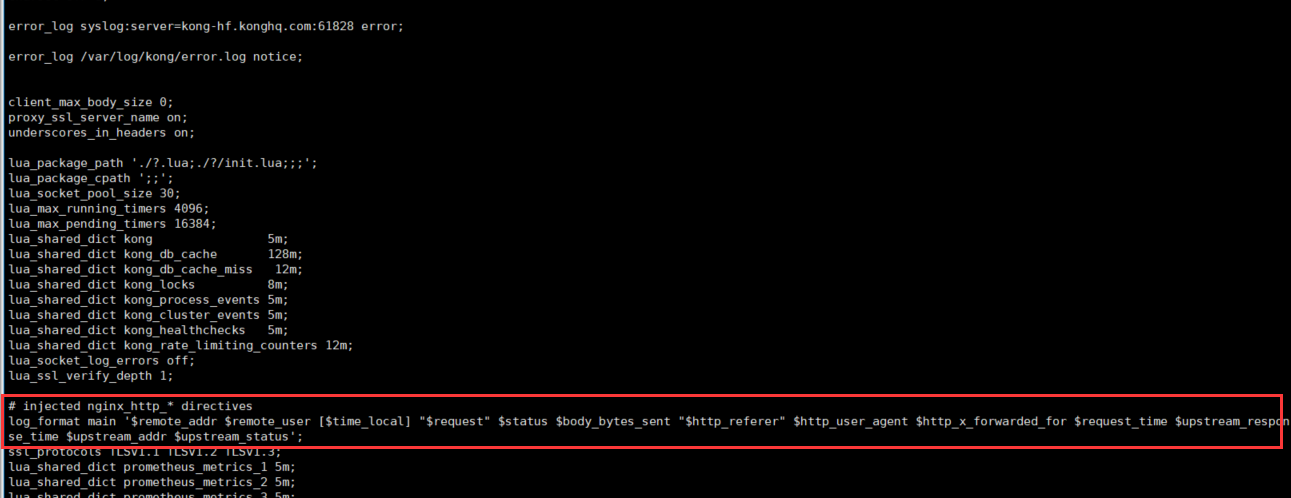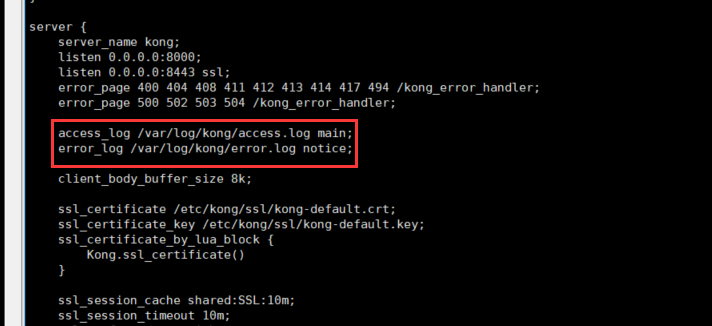## 配置指令
1、在kong.conf中增加如下配置:
```
nginx_http_log_format=main '$remote_addr $remote_user [$time_local] "$request" $status $body_bytes_sent "$http_referer" $http_user_agent $http_x_forwarded_for $request_time $upstream_response_time $upstream_addr $upstream_status'
```
2、在kong.conf中修改proxy_access_log為:
```
proxy_access_log = logs/access.log main
```
3、最終配置結果為:

4、重啟kong后,查看nginx-kong.conf文件,會看到注入指令相關信息:

server 模塊中:

## 結果驗證
```
192.168.66.144 - [14/Jan/2021:17:49:27 +0800] "GET /request HTTP/1.1" 401 26 "-" curl/7.29.0 - 0.003 - - -
192.168.66.144 - [14/Jan/2021:17:49:32 +0800] "GET /request HTTP/1.1" 401 26 "-" curl/7.29.0 - 0.003 - - -
```
對比一下是否和上面配置的format是一致的呢?一致說明配置生效了。日志中的`-`其實對應的是沒有數據,所以最后連續的三個`-`對應`$upstream_response_time $upstream_addr $upstream_status`,這三個變量沒有值,為什么?
因為format格式中使用的變量其實是nginx http,upstream,log等模塊提供的,具體有什么變量可用,可查閱[官方文檔](http://nginx.org/en/docs/http/ngx_http_core_module.html)。由于我這里使用Kong作為一個簡單的請求代理,并未使用upstream模塊來做對上游服務的度負載均衡,所以所有`$upstream`開頭的變量是沒有值的。
基于此應當明白,這樣的配置日志格式,僅僅是使用了nginx提供的功能,這里的配置與使用Kong的日志插件沒有關系。此種方式也并不能使用openresty和kong提供的變量,比如獲取請求處理過程中的延遲情況。所以這種方式的日志能提供的信息很少,**要想獲取更加全面的日志信息,應當使用日志插件**。
## 自定義變量
前面提到,nginx內置變量固定,log中只能記錄nginx變量,但是我們可以自定義變量,在請求處理過程中寫入值,然后配置log\_format輸出。假設我現在想要記錄token里的clientid,應該怎么做呢?
1. 使用set指令自定義一個變量client\_id,默認值為空字符,即在kong.conf文件中增加如下配置:`nginx_proxy_set=$client_id ''`
2. 在jwt插件中解析token后,取到clientid的值并寫入變量:`ngx.var.client_id = kong.ctx.plugin.client_id`
3. 修改log\_format :`nginx_http_log_format=main '$remote_addr - $remote_user [$time_local] "$request" $status $body_bytes_sent "$http_referer" "$http_user_agent" $request_time "$http_authorization" "$client_id" '`
- 1. 概述
- 2. 快速安裝
- 2.1 環境準備
- 2.2 開始安裝
- 2.3 啟動/關閉kongx
- 2.4 使用kongx
- 3. 使用指南
- 3.0 mockbin配置示例
- 3.0.1 不含upstream的配置
- 3.0.2 含upstream的配置
- 3.1 Gateway
- 3.1.1 Upstreams
- 3.1.1.1 新增/修改upstreams
- 3.1.1.2 管理targets
- 3.1.1.3 設置健康檢查
- 3.1.1.4 upstream視圖
- 3.1.2 Services
- 3.1.2.1 新建/修改service
- 3.1.2.2 添加服務路由
- 3.1.2.3 添加服務插件
- 3.1.2.4 同步services
- 3.1.2.5 services視圖
- 3.1.3 Routes
- 3.1.3.1 路由列表
- 3.1.3.2 修改路由
- 3.1.3.3 批量修改HOSTS
- 3.1.4 Plugins
- 3.1.4.1 新增插件
- 3.1.4.2 插件列表
- 3.1.5 Consumers
- 3.1.5.1 新建/修改consumers
- 3.1.6 Kong Shell
- 3.1.6.1 shell安裝
- 3.1.6.2 使用Shell
- 3.2 系統管理
- 3.2.1 用戶管理
- 3.2.2 角色管理
- 3.2.3 用戶組管理
- 3.2.4 菜單管理
- 3.3 參數管理
- 3.3.1 環境管理
- 3.3.2 系統參數
- 3.3.3 如何增加多個環境?
- 3.4 日志管理
- 3.4.1 操作日志
- 3.4.2 同步日志
- 3.5 工具箱
- 3.5.1 Kong Shell
- 3.5.2 切換工作臺
- 3.6 網關流水線
- 3.6.1 Pipeline
- 4. 最佳實踐
- 4.1 灰度插件canary使用
- 4.2 kong與consul集成
- 4.2.1 使用kong提供dns服務
- 4.2.2 使用dnsmasq提供dns服務
- 4.2.3 使用consul自主發現服務
- 4.3 kong健康檢查
- 4.3.1 簡介
- 4.3.2 健康檢查(主動檢查)
- 4.3.3 斷路器(被動檢查)
- 4.3.4 總結
- 4.4 認證插件之key-auth
- 4.5 認證插件之basic-auth
- 4.6 認證插件之oauth2-auth
- 4.7 認證插件之jwt
- 4.8 kong自定義access_log格式
- 4.8.1 前言
- 4.8.2 配置文本格式
- 4.8.3 配置JSON格式
- 4.9 kong的訪問監控
- 4.9.1 解決方案
- 4.9.2 方案實施
- 4.9.3 接入grafana報表
- 5. 常見問題
- 5.1 默認賬號及密碼
- 5.2 新增用戶默認密碼為123456
- 5.3 如何設置超級管理員
- 5.4 密碼忘記了咋辦
- 6. Kong
- 6.1 Kong簡介
- 6.2 kong安裝指南
- 6.2.1 kong安裝-RPM
- 6.2.2 kong安裝-源碼
- 6.2.3 kong基于yum源安裝
- 6.3 Admin API
- 6.3.1 API支持兩種內容類型
- 6.3.2 聲明式配置(Declarative Configuration)
- 6.3.3 獲取實體schema
- 6.3.4 services
- 6.3.5 Routes
- 6.3.6 Consumers
- 6.3.7 Plugins
- 6.3.8 Certficate
- 6.3.9 CA certficate(1.3.x+以上版本)
- 6.3.10 SNI
- 6.3.11 Upstreams
- 6.3.12 Targets
- 6.4 Kong使用
- 6.4.1 DB-LESS模式
- 6.4.2 DB模式